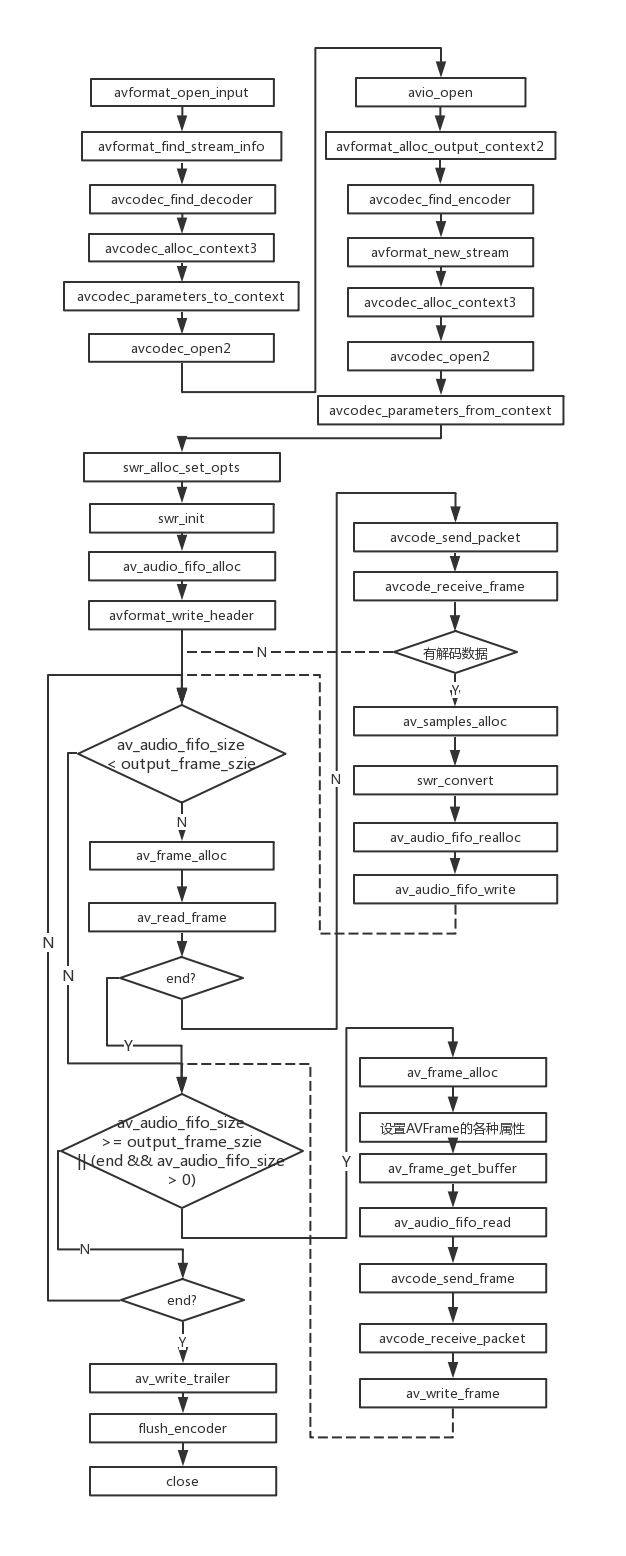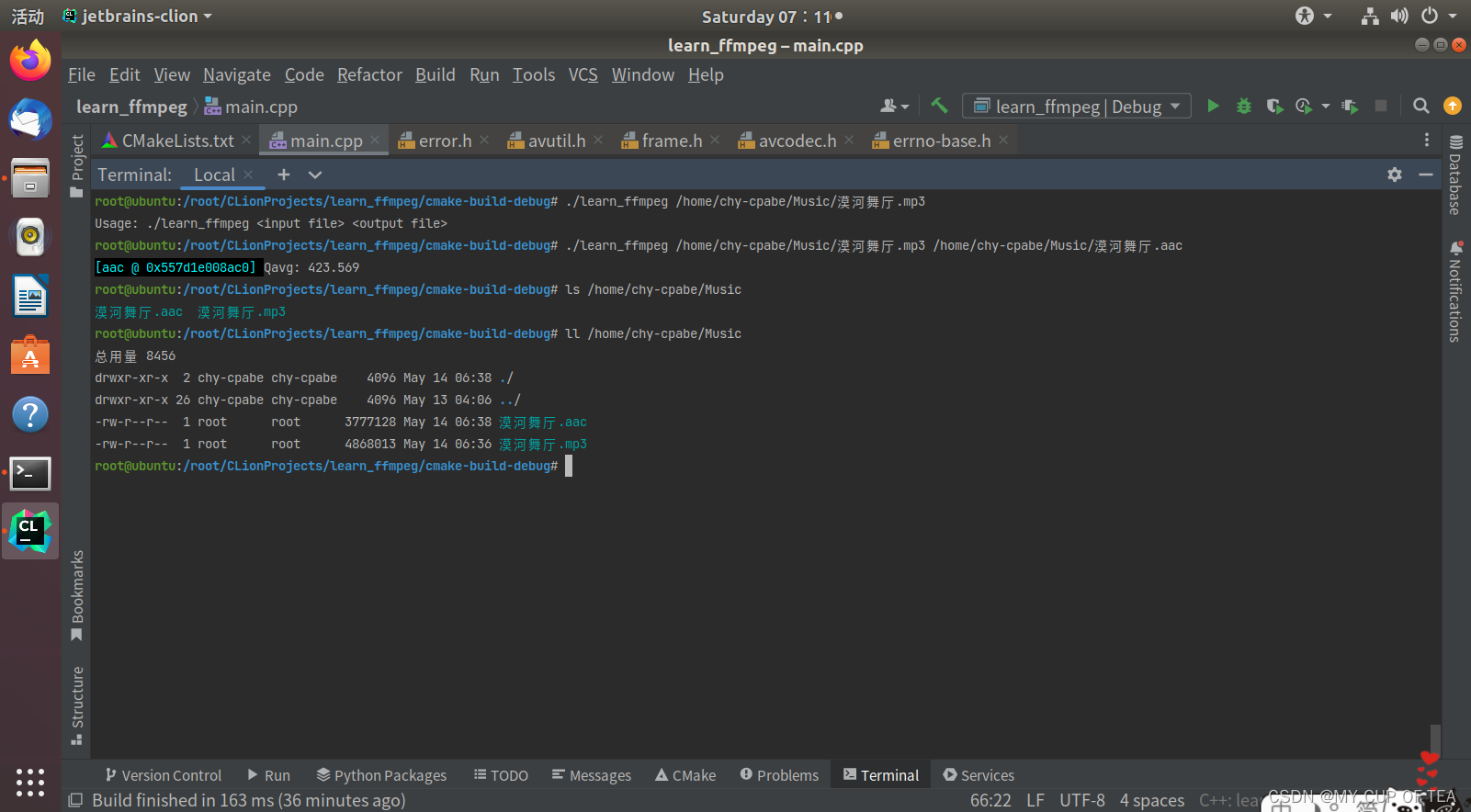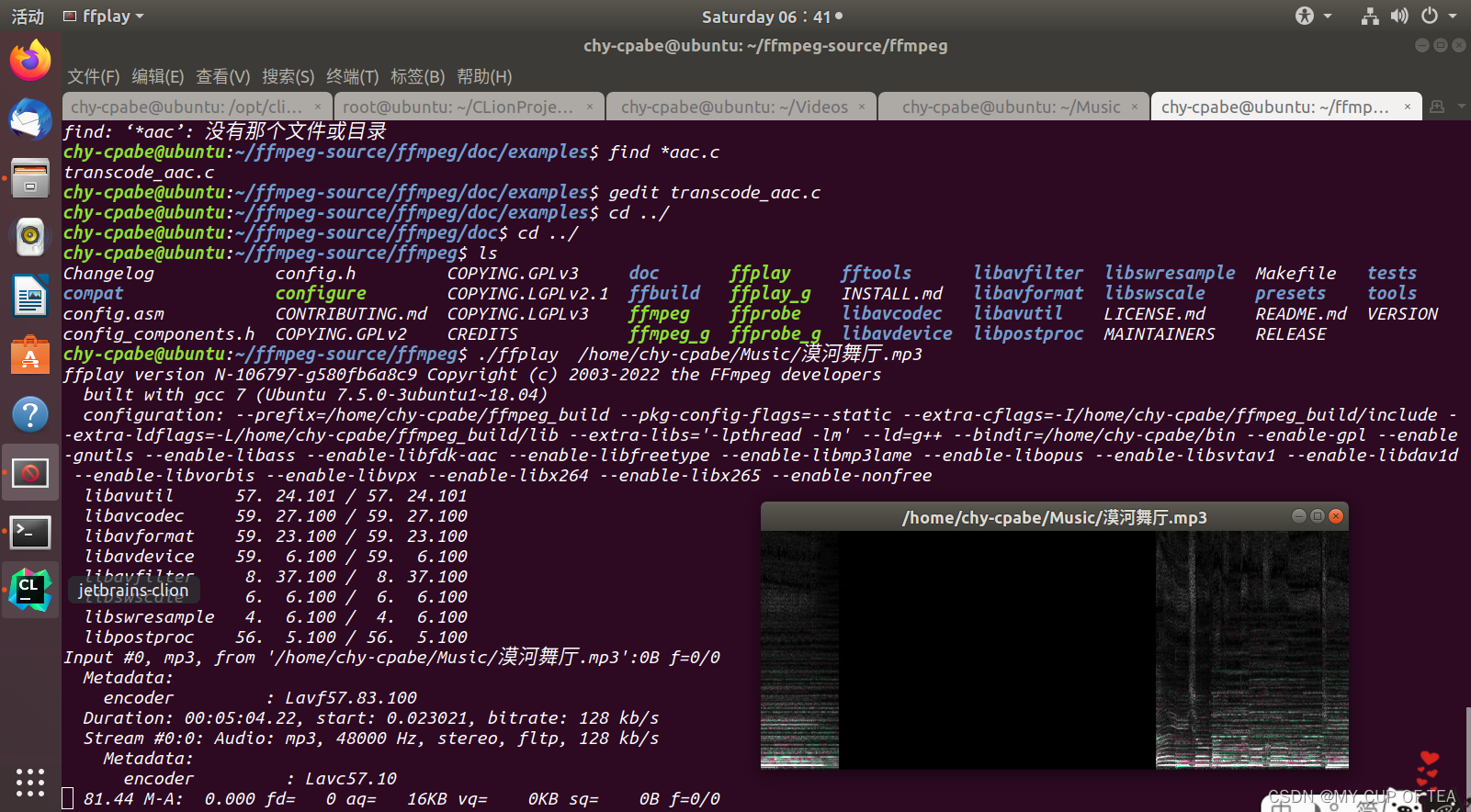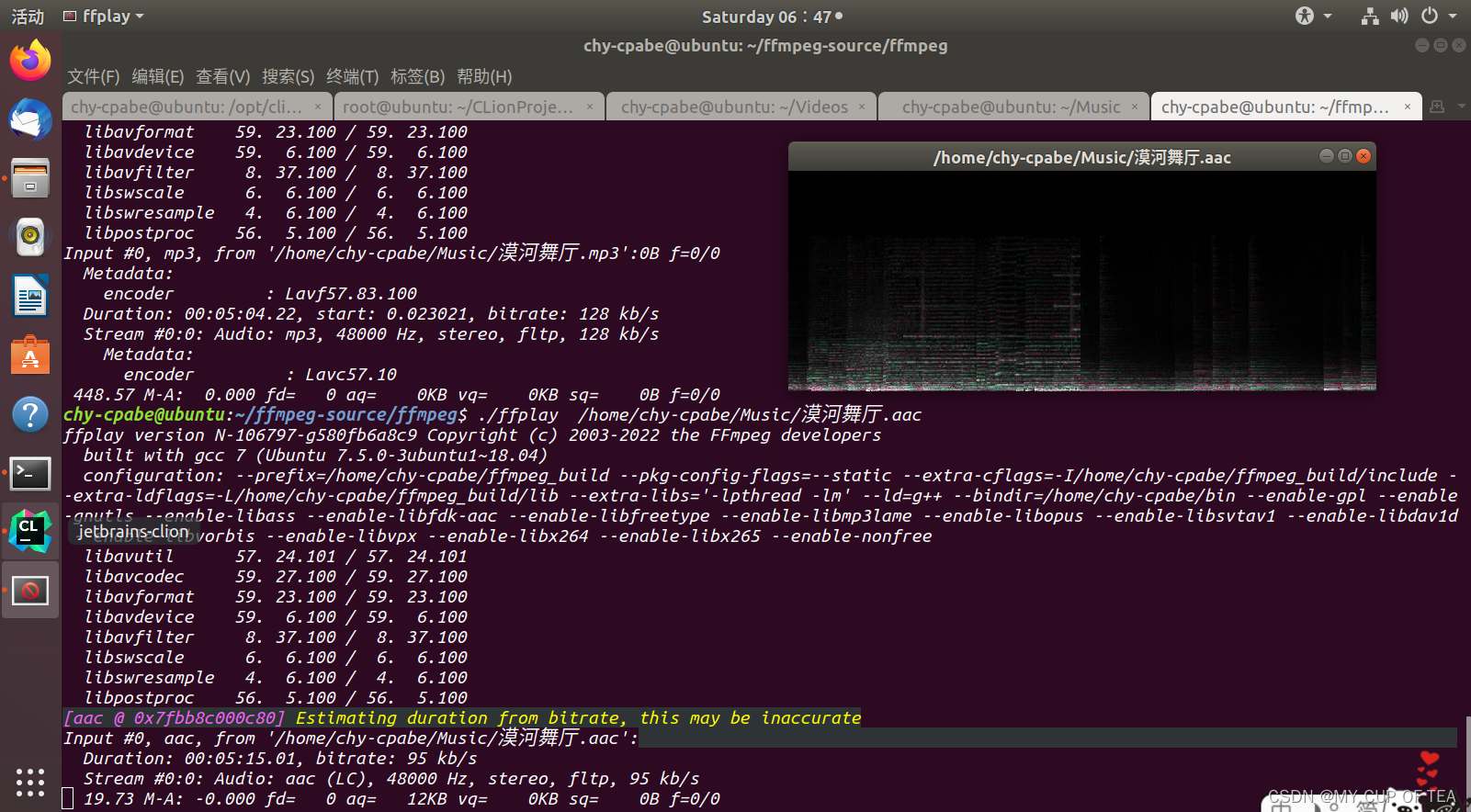介绍
- 编码流程类似于视频编码,1,查找编码器;2,设定参数,打开编码器;3,数据编码
- 编码函数 avcodec_encode_audio2 已经被弃用
- FFmpeg 过时 Api 汇总整理 - 灰色飘零 - 博客园 未成功
- 使用
- 旧版本
- if (avcodec_encode_audio2(tmpAvCodecCtx, &pkt_out, frame, &got_picture) < 0)
- 新版本
- if(avcodec_send_frame(tmpAvCodecCtx, frame)<0 || (got_picture=avcodec_receive_packet(tmpAvCodecCtx, &pkt_out))<0)
- 本文研究的是 官方的例子,并未使用 上述函数
参考链接
- FFmpeg/transcode_aac.c at release/4.1 · FFmpeg/FFmpeg · GitHub 修改后成功
- 源码示例 存放路径/home/chy-cpabe/ffmpeg-source/ffmpeg/doc/examples/transcode_aac.c
- GitHub - FFmpeg/FFmpeg: Mirror of https://git.ffmpeg.org/ffmpeg.git Github官网
- 编解码API的详细介绍参见 FFmpeg音频解码。
- 转封装流程的详细介绍参见 FFmpeg转封装(remuxing)。
- 其中音频重采样流程的介绍见 FFmpeg音频重采样API(libswresample)。
- AVAudioFifo的介绍参见FFmpeg 示例转封装转码-transcoding。
- 作者:smallest_one 链接:FFmpeg 示例音频转码为AAC - 简书
- AAC编解码简析_Geek.Fan的博客-CSDN博客_aac解码什么意思
注意事项
- ffplay播放工具 存储路径 /home/chy-cpabe/ffmpeg-source/ffmpeg
- 引入ffmpeg编译错误taking address of temporary array
- ibavutil/error.h:120:95: 错误:taking address of temporary array av_make_error_string((char[AV_ERROR_MAX_STRING_SIZE]){0}, AV_ERROR_MAX_STRING_SIZE, errnum) 这里使用了的临时变量作为返回值,因此报错。把这个宏定义改为一个函数,仍然不可以避免这个报错
- normalize_ts.cpp:217:49: error: taking address of temporary array · Issue #5 · joncampbell123/composite-video-simulator · GitHub
- 补充代码
#ifdef av_err2str
#undef av_err2str
#include <string>
av_always_inline std::string av_err2string(int errnum) {char str[AV_ERROR_MAX_STRING_SIZE];return av_make_error_string(str, AV_ERROR_MAX_STRING_SIZE, errnum);
}
#define av_err2str(err) av_err2string(err).c_str()
#endif // av_err2str
- 输入的文件中只能有一个音频流,否则会报错
- 输出的音频的编码格式为AAC
- 使用这个示例程序将其他格式的音频文件比如mp3、wav等格式转换为aac格式
执行流程

完整代码
#include <cstdio>
#include <cstdlib>
#include <cstdint>extern "C" {
#include<libavcodec/avcodec.h>#include "libavformat/avformat.h"
#include "libavformat/avio.h"#include <libavutil/channel_layout.h>
#include <libavutil/common.h>
#include <libavutil/frame.h>
#include <libavutil/samplefmt.h>
#include <libavutil/audio_fifo.h>
#include "libavutil/avassert.h"
#include "libavutil/avstring.h"
#include "libavutil/opt.h"#include "libswresample/swresample.h"
}/** Copyright (c) 2013-2022 Andreas Unterweger** This file is part of FFmpeg.** FFmpeg is free software; you can redistribute it and/or* modify it under the terms of the GNU Lesser General Public* License as published by the Free Software Foundation; either* version 2.1 of the License, or (at your option) any later version.** FFmpeg is distributed in the hope that it will be useful,* but WITHOUT ANY WARRANTY; without even the implied warranty of* MERCHANTABILITY or FITNESS FOR A PARTICULAR PURPOSE. See the GNU* Lesser General Public License for more details.** You should have received a copy of the GNU Lesser General Public* License along with FFmpeg; if not, write to the Free Software* Foundation, Inc., 51 Franklin Street, Fifth Floor, Boston, MA 02110-1301 USA*//*** @file* Simple audio converter** @example transcode_aac.c* Convert an input audio file to AAC in an MP4 container using FFmpeg.* Formats other than MP4 are supported based on the output file extension.* @author Andreas Unterweger (dustsigns@gmail.com)*//* The output bit rate in bit/s */
#define OUTPUT_BIT_RATE 96000
/* The number of output channels */
#define OUTPUT_CHANNELS 2#ifdef av_err2str
#undef av_err2str
#include <string>
av_always_inline std::string av_err2string(int errnum) {char str[AV_ERROR_MAX_STRING_SIZE];return av_make_error_string(str, AV_ERROR_MAX_STRING_SIZE, errnum);
}
#define av_err2str(err) av_err2string(err).c_str()
#endif // av_err2str/*** Open an input file and the required decoder.* @param filename File to be opened* @param[out] input_format_context Format context of opened file* @param[out] input_codec_context Codec context of opened file* @return Error code (0 if successful)*/
static int open_input_file(const char *filename,AVFormatContext **input_format_context,AVCodecContext **input_codec_context)
{AVCodecContext *avctx;const AVCodec *input_codec;const AVStream *stream;int error;/* Open the input file to read from it. */if ((error = avformat_open_input(input_format_context, filename, NULL,NULL)) < 0) {fprintf(stderr, "Could not open input file '%s' (error '%s')\n",filename, av_err2str(error));*input_format_context = NULL;return error;}/* Get information on the input file (number of streams etc.). */if ((error = avformat_find_stream_info(*input_format_context, NULL)) < 0) {fprintf(stderr, "Could not open find stream info (error '%s')\n",av_err2str(error));avformat_close_input(input_format_context);return error;}/* Make sure that there is only one stream in the input file. */if ((*input_format_context)->nb_streams != 1) {fprintf(stderr, "Expected one audio input stream, but found %d\n",(*input_format_context)->nb_streams);avformat_close_input(input_format_context);return AVERROR_EXIT;}stream = (*input_format_context)->streams[0];/* Find a decoder for the audio stream. */if (!(input_codec = avcodec_find_decoder(stream->codecpar->codec_id))) {fprintf(stderr, "Could not find input codec\n");avformat_close_input(input_format_context);return AVERROR_EXIT;}/* Allocate a new decoding context. */avctx = avcodec_alloc_context3(input_codec);if (!avctx) {fprintf(stderr, "Could not allocate a decoding context\n");avformat_close_input(input_format_context);return AVERROR(ENOMEM);}/* Initialize the stream parameters with demuxer information. */error = avcodec_parameters_to_context(avctx, stream->codecpar);if (error < 0) {avformat_close_input(input_format_context);avcodec_free_context(&avctx);return error;}/* Open the decoder for the audio stream to use it later. */if ((error = avcodec_open2(avctx, input_codec, NULL)) < 0) {fprintf(stderr, "Could not open input codec (error '%s')\n",av_err2str(error));avcodec_free_context(&avctx);avformat_close_input(input_format_context);return error;}/* Set the packet timebase for the decoder. */avctx->pkt_timebase = stream->time_base;/* Save the decoder context for easier access later. */*input_codec_context = avctx;return 0;
}/*** Open an output file and the required encoder.* Also set some basic encoder parameters.* Some of these parameters are based on the input file's parameters.* @param filename File to be opened* @param input_codec_context Codec context of input file* @param[out] output_format_context Format context of output file* @param[out] output_codec_context Codec context of output file* @return Error code (0 if successful)*/
static int open_output_file(const char *filename,AVCodecContext *input_codec_context,AVFormatContext **output_format_context,AVCodecContext **output_codec_context)
{AVCodecContext *avctx = NULL;AVIOContext *output_io_context = NULL;AVStream *stream = NULL;const AVCodec *output_codec = NULL;int error;/* Open the output file to write to it. */if ((error = avio_open(&output_io_context, filename,AVIO_FLAG_WRITE)) < 0) {fprintf(stderr, "Could not open output file '%s' (error '%s')\n",filename, av_err2str(error));return error;}/* Create a new format context for the output container format. */if (!(*output_format_context = avformat_alloc_context())) {fprintf(stderr, "Could not allocate output format context\n");return AVERROR(ENOMEM);}/* Associate the output file (pointer) with the container format context. */(*output_format_context)->pb = output_io_context;/* Guess the desired container format based on the file extension. */if (!((*output_format_context)->oformat = av_guess_format(NULL, filename,NULL))) {fprintf(stderr, "Could not find output file format\n");goto cleanup;}if (!((*output_format_context)->url = av_strdup(filename))) {fprintf(stderr, "Could not allocate url.\n");error = AVERROR(ENOMEM);goto cleanup;}/* Find the encoder to be used by its name. */if (!(output_codec = avcodec_find_encoder(AV_CODEC_ID_AAC))) {fprintf(stderr, "Could not find an AAC encoder.\n");goto cleanup;}/* Create a new audio stream in the output file container. */if (!(stream = avformat_new_stream(*output_format_context, NULL))) {fprintf(stderr, "Could not create new stream\n");error = AVERROR(ENOMEM);goto cleanup;}avctx = avcodec_alloc_context3(output_codec);if (!avctx) {fprintf(stderr, "Could not allocate an encoding context\n");error = AVERROR(ENOMEM);goto cleanup;}/* Set the basic encoder parameters.* The input file's sample rate is used to avoid a sample rate conversion. */av_channel_layout_default(&avctx->ch_layout, OUTPUT_CHANNELS);avctx->sample_rate = input_codec_context->sample_rate;avctx->sample_fmt = output_codec->sample_fmts[0];avctx->bit_rate = OUTPUT_BIT_RATE;/* Set the sample rate for the container. */stream->time_base.den = input_codec_context->sample_rate;stream->time_base.num = 1;/* Some container formats (like MP4) require global headers to be present.* Mark the encoder so that it behaves accordingly. */if ((*output_format_context)->oformat->flags & AVFMT_GLOBALHEADER)avctx->flags |= AV_CODEC_FLAG_GLOBAL_HEADER;/* Open the encoder for the audio stream to use it later. */if ((error = avcodec_open2(avctx, output_codec, NULL)) < 0) {fprintf(stderr, "Could not open output codec (error '%s')\n",av_err2str(error));goto cleanup;}error = avcodec_parameters_from_context(stream->codecpar, avctx);if (error < 0) {fprintf(stderr, "Could not initialize stream parameters\n");goto cleanup;}/* Save the encoder context for easier access later. */*output_codec_context = avctx;return 0;cleanup:avcodec_free_context(&avctx);avio_closep(&(*output_format_context)->pb);avformat_free_context(*output_format_context);*output_format_context = NULL;return error < 0 ? error : AVERROR_EXIT;
}/*** Initialize one data packet for reading or writing.* @param[out] packet Packet to be initialized* @return Error code (0 if successful)*/
static int init_packet(AVPacket **packet)
{if (!(*packet = av_packet_alloc())) {fprintf(stderr, "Could not allocate packet\n");return AVERROR(ENOMEM);}return 0;
}/*** Initialize one audio frame for reading from the input file.* @param[out] frame Frame to be initialized* @return Error code (0 if successful)*/
static int init_input_frame(AVFrame **frame)
{if (!(*frame = av_frame_alloc())) {fprintf(stderr, "Could not allocate input frame\n");return AVERROR(ENOMEM);}return 0;
}/*** Initialize the audio resampler based on the input and output codec settings.* If the input and output sample formats differ, a conversion is required* libswresample takes care of this, but requires initialization.* @param input_codec_context Codec context of the input file* @param output_codec_context Codec context of the output file* @param[out] resample_context Resample context for the required conversion* @return Error code (0 if successful)*/
static int init_resampler(AVCodecContext *input_codec_context,AVCodecContext *output_codec_context,SwrContext **resample_context)
{int error;/** Create a resampler context for the conversion.* Set the conversion parameters.*/error = swr_alloc_set_opts2(resample_context,&output_codec_context->ch_layout,output_codec_context->sample_fmt,output_codec_context->sample_rate,&input_codec_context->ch_layout,input_codec_context->sample_fmt,input_codec_context->sample_rate,0, NULL);if (error < 0) {fprintf(stderr, "Could not allocate resample context\n");return error;}/** Perform a sanity check so that the number of converted samples is* not greater than the number of samples to be converted.* If the sample rates differ, this case has to be handled differently*/av_assert0(output_codec_context->sample_rate == input_codec_context->sample_rate);/* Open the resampler with the specified parameters. */if ((error = swr_init(*resample_context)) < 0) {fprintf(stderr, "Could not open resample context\n");swr_free(resample_context);return error;}return 0;
}/*** Initialize a FIFO buffer for the audio samples to be encoded.* @param[out] fifo Sample buffer* @param output_codec_context Codec context of the output file* @return Error code (0 if successful)*/
static int init_fifo(AVAudioFifo **fifo, AVCodecContext *output_codec_context)
{/* Create the FIFO buffer based on the specified output sample format. */if (!(*fifo = av_audio_fifo_alloc(output_codec_context->sample_fmt,output_codec_context->ch_layout.nb_channels, 1))) {fprintf(stderr, "Could not allocate FIFO\n");return AVERROR(ENOMEM);}return 0;
}/*** Write the header of the output file container.* @param output_format_context Format context of the output file* @return Error code (0 if successful)*/
static int write_output_file_header(AVFormatContext *output_format_context)
{int error;if ((error = avformat_write_header(output_format_context, NULL)) < 0) {fprintf(stderr, "Could not write output file header (error '%s')\n",av_err2str(error));return error;}return 0;
}/*** Decode one audio frame from the input file.* @param frame Audio frame to be decoded* @param input_format_context Format context of the input file* @param input_codec_context Codec context of the input file* @param[out] data_present Indicates whether data has been decoded* @param[out] finished Indicates whether the end of file has* been reached and all data has been* decoded. If this flag is false, there* is more data to be decoded, i.e., this* function has to be called again.* @return Error code (0 if successful)*/
static int decode_audio_frame(AVFrame *frame,AVFormatContext *input_format_context,AVCodecContext *input_codec_context,int *data_present, int *finished)
{/* Packet used for temporary storage. */AVPacket *input_packet;int error;error = init_packet(&input_packet);if (error < 0)return error;*data_present = 0;*finished = 0;/* Read one audio frame from the input file into a temporary packet. */if ((error = av_read_frame(input_format_context, input_packet)) < 0) {/* If we are at the end of the file, flush the decoder below. */if (error == AVERROR_EOF)*finished = 1;else {fprintf(stderr, "Could not read frame (error '%s')\n",av_err2str(error));goto cleanup;}}/* Send the audio frame stored in the temporary packet to the decoder.* The input audio stream decoder is used to do this. */if ((error = avcodec_send_packet(input_codec_context, input_packet)) < 0) {fprintf(stderr, "Could not send packet for decoding (error '%s')\n",av_err2str(error));goto cleanup;}/* Receive one frame from the decoder. */error = avcodec_receive_frame(input_codec_context, frame);/* If the decoder asks for more data to be able to decode a frame,* return indicating that no data is present. */if (error == AVERROR(EAGAIN)) {error = 0;goto cleanup;/* If the end of the input file is reached, stop decoding. */} else if (error == AVERROR_EOF) {*finished = 1;error = 0;goto cleanup;} else if (error < 0) {fprintf(stderr, "Could not decode frame (error '%s')\n",av_err2str(error));goto cleanup;/* Default case: Return decoded data. */} else {*data_present = 1;goto cleanup;}cleanup:av_packet_free(&input_packet);return error;
}/*** Initialize a temporary storage for the specified number of audio samples.* The conversion requires temporary storage due to the different format.* The number of audio samples to be allocated is specified in frame_size.* @param[out] converted_input_samples Array of converted samples. The* dimensions are reference, channel* (for multi-channel audio), sample.* @param output_codec_context Codec context of the output file* @param frame_size Number of samples to be converted in* each round* @return Error code (0 if successful)*/
static int init_converted_samples(uint8_t ***converted_input_samples,AVCodecContext *output_codec_context,int frame_size)
{int error;/* Allocate as many pointers as there are audio channels.* Each pointer will later point to the audio samples of the corresponding* channels (although it may be NULL for interleaved formats).*/if (!(*converted_input_samples = static_cast<uint8_t **>(calloc(output_codec_context->ch_layout.nb_channels,sizeof(**converted_input_samples))))) {fprintf(stderr, "Could not allocate converted input sample pointers\n");return AVERROR(ENOMEM);}/* Allocate memory for the samples of all channels in one consecutive* block for convenience. */if ((error = av_samples_alloc(*converted_input_samples, NULL,output_codec_context->ch_layout.nb_channels,frame_size,output_codec_context->sample_fmt, 0)) < 0) {fprintf(stderr,"Could not allocate converted input samples (error '%s')\n",av_err2str(error));av_freep(&(*converted_input_samples)[0]);free(*converted_input_samples);return error;}return 0;
}/*** Convert the input audio samples into the output sample format.* The conversion happens on a per-frame basis, the size of which is* specified by frame_size.* @param input_data Samples to be decoded. The dimensions are* channel (for multi-channel audio), sample.* @param[out] converted_data Converted samples. The dimensions are channel* (for multi-channel audio), sample.* @param frame_size Number of samples to be converted* @param resample_context Resample context for the conversion* @return Error code (0 if successful)*/
static int convert_samples(const uint8_t **input_data,uint8_t **converted_data, const int frame_size,SwrContext *resample_context)
{int error;/* Convert the samples using the resampler. */if ((error = swr_convert(resample_context,converted_data, frame_size,input_data , frame_size)) < 0) {fprintf(stderr, "Could not convert input samples (error '%s')\n",av_err2str(error));return error;}return 0;
}/*** Add converted input audio samples to the FIFO buffer for later processing.* @param fifo Buffer to add the samples to* @param converted_input_samples Samples to be added. The dimensions are channel* (for multi-channel audio), sample.* @param frame_size Number of samples to be converted* @return Error code (0 if successful)*/
static int add_samples_to_fifo(AVAudioFifo *fifo,uint8_t **converted_input_samples,const int frame_size)
{int error;/* Make the FIFO as large as it needs to be to hold both,* the old and the new samples. */if ((error = av_audio_fifo_realloc(fifo, av_audio_fifo_size(fifo) + frame_size)) < 0) {fprintf(stderr, "Could not reallocate FIFO\n");return error;}/* Store the new samples in the FIFO buffer. */if (av_audio_fifo_write(fifo, (void **)converted_input_samples,frame_size) < frame_size) {fprintf(stderr, "Could not write data to FIFO\n");return AVERROR_EXIT;}return 0;
}/*** Read one audio frame from the input file, decode, convert and store* it in the FIFO buffer.* @param fifo Buffer used for temporary storage* @param input_format_context Format context of the input file* @param input_codec_context Codec context of the input file* @param output_codec_context Codec context of the output file* @param resampler_context Resample context for the conversion* @param[out] finished Indicates whether the end of file has* been reached and all data has been* decoded. If this flag is false,* there is more data to be decoded,* i.e., this function has to be called* again.* @return Error code (0 if successful)*/
static int read_decode_convert_and_store(AVAudioFifo *fifo,AVFormatContext *input_format_context,AVCodecContext *input_codec_context,AVCodecContext *output_codec_context,SwrContext *resampler_context,int *finished)
{/* Temporary storage of the input samples of the frame read from the file. */AVFrame *input_frame = NULL;/* Temporary storage for the converted input samples. */uint8_t **converted_input_samples = NULL;int data_present;int ret = AVERROR_EXIT;/* Initialize temporary storage for one input frame. */if (init_input_frame(&input_frame))goto cleanup;/* Decode one frame worth of audio samples. */if (decode_audio_frame(input_frame, input_format_context,input_codec_context, &data_present, finished))goto cleanup;/* If we are at the end of the file and there are no more samples* in the decoder which are delayed, we are actually finished.* This must not be treated as an error. */if (*finished) {ret = 0;goto cleanup;}/* If there is decoded data, convert and store it. */if (data_present) {/* Initialize the temporary storage for the converted input samples. */if (init_converted_samples(&converted_input_samples, output_codec_context,input_frame->nb_samples))goto cleanup;/* Convert the input samples to the desired output sample format.* This requires a temporary storage provided by converted_input_samples. */if (convert_samples((const uint8_t**)input_frame->extended_data, converted_input_samples,input_frame->nb_samples, resampler_context))goto cleanup;/* Add the converted input samples to the FIFO buffer for later processing. */if (add_samples_to_fifo(fifo, converted_input_samples,input_frame->nb_samples))goto cleanup;ret = 0;}ret = 0;cleanup:if (converted_input_samples) {av_freep(&converted_input_samples[0]);free(converted_input_samples);}av_frame_free(&input_frame);return ret;
}/*** Initialize one input frame for writing to the output file.* The frame will be exactly frame_size samples large.* @param[out] frame Frame to be initialized* @param output_codec_context Codec context of the output file* @param frame_size Size of the frame* @return Error code (0 if successful)*/
static int init_output_frame(AVFrame **frame,AVCodecContext *output_codec_context,int frame_size)
{int error;/* Create a new frame to store the audio samples. */if (!(*frame = av_frame_alloc())) {fprintf(stderr, "Could not allocate output frame\n");return AVERROR_EXIT;}/* Set the frame's parameters, especially its size and format.* av_frame_get_buffer needs this to allocate memory for the* audio samples of the frame.* Default channel layouts based on the number of channels* are assumed for simplicity. */(*frame)->nb_samples = frame_size;av_channel_layout_copy(&(*frame)->ch_layout, &output_codec_context->ch_layout);(*frame)->format = output_codec_context->sample_fmt;(*frame)->sample_rate = output_codec_context->sample_rate;/* Allocate the samples of the created frame. This call will make* sure that the audio frame can hold as many samples as specified. */if ((error = av_frame_get_buffer(*frame, 0)) < 0) {fprintf(stderr, "Could not allocate output frame samples (error '%s')\n",av_err2str(error));av_frame_free(frame);return error;}return 0;
}/* Global timestamp for the audio frames. */
static int64_t pts = 0;/*** Encode one frame worth of audio to the output file.* @param frame Samples to be encoded* @param output_format_context Format context of the output file* @param output_codec_context Codec context of the output file* @param[out] data_present Indicates whether data has been* encoded* @return Error code (0 if successful)*/
static int encode_audio_frame(AVFrame *frame,AVFormatContext *output_format_context,AVCodecContext *output_codec_context,int *data_present)
{/* Packet used for temporary storage. */AVPacket *output_packet;int error;error = init_packet(&output_packet);if (error < 0)return error;/* Set a timestamp based on the sample rate for the container. */if (frame) {frame->pts = pts;pts += frame->nb_samples;}*data_present = 0;/* Send the audio frame stored in the temporary packet to the encoder.* The output audio stream encoder is used to do this. */error = avcodec_send_frame(output_codec_context, frame);/* Check for errors, but proceed with fetching encoded samples if the* encoder signals that it has nothing more to encode. */if (error < 0 && error != AVERROR_EOF) {fprintf(stderr, "Could not send packet for encoding (error '%s')\n",av_err2str(error));goto cleanup;}/* Receive one encoded frame from the encoder. */error = avcodec_receive_packet(output_codec_context, output_packet);/* If the encoder asks for more data to be able to provide an* encoded frame, return indicating that no data is present. */if (error == AVERROR(EAGAIN)) {error = 0;goto cleanup;/* If the last frame has been encoded, stop encoding. */} else if (error == AVERROR_EOF) {error = 0;goto cleanup;} else if (error < 0) {fprintf(stderr, "Could not encode frame (error '%s')\n",av_err2str(error));goto cleanup;/* Default case: Return encoded data. */} else {*data_present = 1;}/* Write one audio frame from the temporary packet to the output file. */if (*data_present &&(error = av_write_frame(output_format_context, output_packet)) < 0) {fprintf(stderr, "Could not write frame (error '%s')\n",av_err2str(error));goto cleanup;}cleanup:av_packet_free(&output_packet);return error;
}/*** Load one audio frame from the FIFO buffer, encode and write it to the* output file.* @param fifo Buffer used for temporary storage* @param output_format_context Format context of the output file* @param output_codec_context Codec context of the output file* @return Error code (0 if successful)*/
static int load_encode_and_write(AVAudioFifo *fifo,AVFormatContext *output_format_context,AVCodecContext *output_codec_context)
{/* Temporary storage of the output samples of the frame written to the file. */AVFrame *output_frame;/* Use the maximum number of possible samples per frame.* If there is less than the maximum possible frame size in the FIFO* buffer use this number. Otherwise, use the maximum possible frame size. */const int frame_size = FFMIN(av_audio_fifo_size(fifo),output_codec_context->frame_size);int data_written;/* Initialize temporary storage for one output frame. */if (init_output_frame(&output_frame, output_codec_context, frame_size))return AVERROR_EXIT;/* Read as many samples from the FIFO buffer as required to fill the frame.* The samples are stored in the frame temporarily. */if (av_audio_fifo_read(fifo, (void **)output_frame->data, frame_size) < frame_size) {fprintf(stderr, "Could not read data from FIFO\n");av_frame_free(&output_frame);return AVERROR_EXIT;}/* Encode one frame worth of audio samples. */if (encode_audio_frame(output_frame, output_format_context,output_codec_context, &data_written)) {av_frame_free(&output_frame);return AVERROR_EXIT;}av_frame_free(&output_frame);return 0;
}/*** Write the trailer of the output file container.* @param output_format_context Format context of the output file* @return Error code (0 if successful)*/
static int write_output_file_trailer(AVFormatContext *output_format_context)
{int error;if ((error = av_write_trailer(output_format_context)) < 0) {fprintf(stderr, "Could not write output file trailer (error '%s')\n",av_err2str(error));return error;}return 0;
}int main(int argc, char **argv)
{AVFormatContext *input_format_context = NULL, *output_format_context = NULL;AVCodecContext *input_codec_context = NULL, *output_codec_context = NULL;SwrContext *resample_context = NULL;AVAudioFifo *fifo = NULL;int ret = AVERROR_EXIT;if (argc != 3) {fprintf(stderr, "Usage: %s <input file> <output file>\n", argv[0]);exit(1);}/* Open the input file for reading. */if (open_input_file(argv[1], &input_format_context,&input_codec_context))goto cleanup;/* Open the output file for writing. */if (open_output_file(argv[2], input_codec_context,&output_format_context, &output_codec_context))goto cleanup;/* Initialize the resampler to be able to convert audio sample formats. */if (init_resampler(input_codec_context, output_codec_context,&resample_context))goto cleanup;/* Initialize the FIFO buffer to store audio samples to be encoded. */if (init_fifo(&fifo, output_codec_context))goto cleanup;/* Write the header of the output file container. */if (write_output_file_header(output_format_context))goto cleanup;/* Loop as long as we have input samples to read or output samples* to write; abort as soon as we have neither. */while (1) {/* Use the encoder's desired frame size for processing. */const int output_frame_size = output_codec_context->frame_size;int finished = 0;/* Make sure that there is one frame worth of samples in the FIFO* buffer so that the encoder can do its work.* Since the decoder's and the encoder's frame size may differ, we* need to FIFO buffer to store as many frames worth of input samples* that they make up at least one frame worth of output samples. */while (av_audio_fifo_size(fifo) < output_frame_size) {/* Decode one frame worth of audio samples, convert it to the* output sample format and put it into the FIFO buffer. */if (read_decode_convert_and_store(fifo, input_format_context,input_codec_context,output_codec_context,resample_context, &finished))goto cleanup;/* If we are at the end of the input file, we continue* encoding the remaining audio samples to the output file. */if (finished)break;}/* If we have enough samples for the encoder, we encode them.* At the end of the file, we pass the remaining samples to* the encoder. */while (av_audio_fifo_size(fifo) >= output_frame_size ||(finished && av_audio_fifo_size(fifo) > 0))/* Take one frame worth of audio samples from the FIFO buffer,* encode it and write it to the output file. */if (load_encode_and_write(fifo, output_format_context,output_codec_context))goto cleanup;/* If we are at the end of the input file and have encoded* all remaining samples, we can exit this loop and finish. */if (finished) {int data_written;/* Flush the encoder as it may have delayed frames. */do {if (encode_audio_frame(NULL, output_format_context,output_codec_context, &data_written))goto cleanup;} while (data_written);break;}}/* Write the trailer of the output file container. */if (write_output_file_trailer(output_format_context))goto cleanup;ret = 0;cleanup:if (fifo)av_audio_fifo_free(fifo);swr_free(&resample_context);if (output_codec_context)avcodec_free_context(&output_codec_context);if (output_format_context) {avio_closep(&output_format_context->pb);avformat_free_context(output_format_context);}if (input_codec_context)avcodec_free_context(&input_codec_context);if (input_format_context)avformat_close_input(&input_format_context);return ret;
}
执行结果
CLion

MP3

aac


















源码级别)


—建筑电气...)


